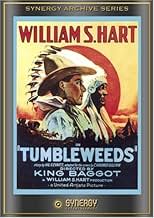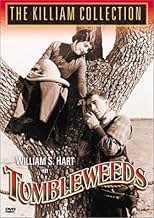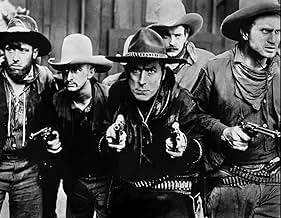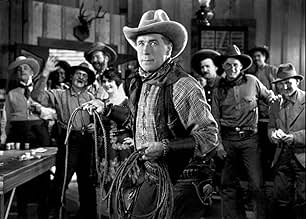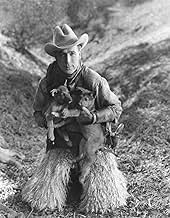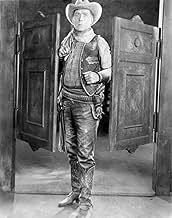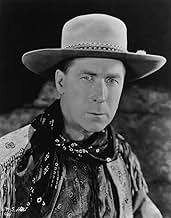The government will grant a fringe of terrain for the settlers who want to live and work there. The starting sign will be a gunshot which will iniciate the run for the best fields and claims... Read allThe government will grant a fringe of terrain for the settlers who want to live and work there. The starting sign will be a gunshot which will iniciate the run for the best fields and claims.The government will grant a fringe of terrain for the settlers who want to live and work there. The starting sign will be a gunshot which will iniciate the run for the best fields and claims.
- Directors
- Writers
- Stars
William S. Hart
- Don Carver
- (as Wm. S. Hart)
- …
Richard Neill
- Bill Freel
- (as Richard R. Niell)
George F. Marion
- Old Man
- (as George Marion)
Taylor N. Duncan
- Cavalry Major
- (as Ted Duncan)
Nora Cecil
- Pioneer Mother
- (uncredited)
Nino Cochise
- Indian
- (uncredited)
Monte Collins
- Hicks
- (uncredited)
Fred Gamble
- Hotel Proprietor
- (uncredited)
George Marion
- Homesteader
- (uncredited)
Apache Bill Russell
- Indian
- (uncredited)
- Directors
- Writers
- All cast & crew
- Production, box office & more at IMDbPro
Featured reviews
"Tumbleweeds" is a classic of the silent era. It marked the final film in the career of western movie pioneer William S. Hart.
The plot revolves around the Cherokee Land Rush of 1889 Oklahoma where a large tract of land was thrown open to the public for the taking by the American government.
Don Carver (Hart) and his pal Kentucky Rose (Lucien Littlefield) had been earning their living as "tumbleweeds", another name for drifting cowpokes. When the last roundup is completed, they decide to take part in the land rush. Carver meets up with the charming Molly Lassiter (Barbara Bedford) after having had an altercation with her half brother Noll (J. Gordon Russell). Noll teams up with Bill Freel (Richard R. Neill) to acquire a choice ranch section by any means necessary. Turns out that Carver has his sights set on the same ranch which he wants to get for Molly.
The highlight of the film is of course, the land rush sequence. It is marvelously staged by Directors King Baggot and Hart himself. A cast of thousands was employed. A remarkable piece of film making for this or any other time.
The version of the film that is usually shown these days is the 1939 re-issue which had sound effects added, as well as a moving prologue filmed especially for this version. It features Hart coming out of retirement and describing the film and then talking about his career and in effect saying goodbye to all of his fans. He had left films after "Tumbleweeds" following a dispute with the film's distributor.
Hart had always insisted on realism in his films. This had worked in his early films but in the 20s, he had to compete with the more popular films of the flamboyant Tom Mix. He had reached his 60s by this time so he wisely decided to go out on top.
Ohh...the thrill of it all!
The plot revolves around the Cherokee Land Rush of 1889 Oklahoma where a large tract of land was thrown open to the public for the taking by the American government.
Don Carver (Hart) and his pal Kentucky Rose (Lucien Littlefield) had been earning their living as "tumbleweeds", another name for drifting cowpokes. When the last roundup is completed, they decide to take part in the land rush. Carver meets up with the charming Molly Lassiter (Barbara Bedford) after having had an altercation with her half brother Noll (J. Gordon Russell). Noll teams up with Bill Freel (Richard R. Neill) to acquire a choice ranch section by any means necessary. Turns out that Carver has his sights set on the same ranch which he wants to get for Molly.
The highlight of the film is of course, the land rush sequence. It is marvelously staged by Directors King Baggot and Hart himself. A cast of thousands was employed. A remarkable piece of film making for this or any other time.
The version of the film that is usually shown these days is the 1939 re-issue which had sound effects added, as well as a moving prologue filmed especially for this version. It features Hart coming out of retirement and describing the film and then talking about his career and in effect saying goodbye to all of his fans. He had left films after "Tumbleweeds" following a dispute with the film's distributor.
Hart had always insisted on realism in his films. This had worked in his early films but in the 20s, he had to compete with the more popular films of the flamboyant Tom Mix. He had reached his 60s by this time so he wisely decided to go out on top.
Ohh...the thrill of it all!
After a while, watching "Tumbleweeds" starts to feel like homework. The movie wore me down after a while. I've seen a lot of silent movie comedies. Many of them aged quite well. As for as dramas go, I haven't seen nearly as many. For me they haven't aged as well. They are a lot harder to watch than the comedies. Add into the mix a very stiff (and seemingly self-serious) William S. Hart and "Tumbleweeds" doesn't stand a chance. There are a few laughs and some exciting action but they are too few and far between. "Tumbleweeds" is okay but it feels a lot longer than its actual running time.
For many years prior to 1889, the US government leased the lands of the Indian Territory to cattleman for grazing their cattle herds. Ranches were built. Now the ranchers had to leave by April 1889 as 1200 square miles of the Oklahoma territory were being opened to new homesteaders. (There would be other Oklahoma land runs throughout the 1890s.)
Hart's character, Don Carver, is the typical quiet and intense cowboy known as a "tumbleweed," a drifting cowhand. Carver and his comedic sidekick Kentucky Rose (Lucien Littlefield) ride into the town of Caldwell, Kansas, population 200. This is the calm before the storm as homesteaders begin to pour into town for the big land run. Carver, and later Kentucky, decides to register for the rush, to acquire a piece of free land. The US Cavalry, in charge, has posted warnings that those who jump the starting line before the appointed time will be arrested as "sooners" and kept in a pen until after the land rush.
Seedy Bill Freel, a/k/a Burton (Richard Niell), craves Joe Hinman's Box K Ranch on the Strip (abandoned by decree) as it controls the waterways of the area. He has a devious plan to sneak across the starting line before the assigned date and time. His new partner is nefarious Noll Lassiter (J. Gordon Russell), half-brother of Molly Lassiter (Barbara Bedford). Freel has a yearning for Molly, who loathes him. She has instead developed a relationship with Carver, nearly forty years her senior in real life. Like Freel, Carver also has his eyes on the Box K property (where he formerly worked), including the ranch house.
When Don rides back into the Strip to look for and round up some straying cattle, he is arrested by US Cavalry Major White (Taylor Duncan) at the instigation of Freel and Noll Lassiter. These sordid characters have falsely accused him of being a "sooner." Now by law Carver is kept in the bull pen until after the land run. How Carver escapes is quite innovative, and he happens to have the fastest steed nearby. If only he can make up the lost ground and stake the Box K Ranch grounds.
When William S. Hart reissued this 1925 silent film (his last and perhaps greatest) in 1939, he preceded it with his famous eight- minute "Farewell to the Screen" introduction. Knowing the real West, Hart had arrived in Hollywood in 1914 at the mature age of 49 and acted for eleven years. He and Tom Mix were the greatest cowboys of the silent screen. Hart's partner here, Lucien Littlefield, specialized in playing older roles. In "Tumbleweeds" he looks about sixty even though he is only thirty. Although not as good as "The Iron Horse" (1924), the greatest silent western of them all, "Tumbleweeds" is still worth a look, especially because of the rousing land rush scene, an epic shot from the days of silent cinema.
Hart's character, Don Carver, is the typical quiet and intense cowboy known as a "tumbleweed," a drifting cowhand. Carver and his comedic sidekick Kentucky Rose (Lucien Littlefield) ride into the town of Caldwell, Kansas, population 200. This is the calm before the storm as homesteaders begin to pour into town for the big land run. Carver, and later Kentucky, decides to register for the rush, to acquire a piece of free land. The US Cavalry, in charge, has posted warnings that those who jump the starting line before the appointed time will be arrested as "sooners" and kept in a pen until after the land rush.
Seedy Bill Freel, a/k/a Burton (Richard Niell), craves Joe Hinman's Box K Ranch on the Strip (abandoned by decree) as it controls the waterways of the area. He has a devious plan to sneak across the starting line before the assigned date and time. His new partner is nefarious Noll Lassiter (J. Gordon Russell), half-brother of Molly Lassiter (Barbara Bedford). Freel has a yearning for Molly, who loathes him. She has instead developed a relationship with Carver, nearly forty years her senior in real life. Like Freel, Carver also has his eyes on the Box K property (where he formerly worked), including the ranch house.
When Don rides back into the Strip to look for and round up some straying cattle, he is arrested by US Cavalry Major White (Taylor Duncan) at the instigation of Freel and Noll Lassiter. These sordid characters have falsely accused him of being a "sooner." Now by law Carver is kept in the bull pen until after the land run. How Carver escapes is quite innovative, and he happens to have the fastest steed nearby. If only he can make up the lost ground and stake the Box K Ranch grounds.
When William S. Hart reissued this 1925 silent film (his last and perhaps greatest) in 1939, he preceded it with his famous eight- minute "Farewell to the Screen" introduction. Knowing the real West, Hart had arrived in Hollywood in 1914 at the mature age of 49 and acted for eleven years. He and Tom Mix were the greatest cowboys of the silent screen. Hart's partner here, Lucien Littlefield, specialized in playing older roles. In "Tumbleweeds" he looks about sixty even though he is only thirty. Although not as good as "The Iron Horse" (1924), the greatest silent western of them all, "Tumbleweeds" is still worth a look, especially because of the rousing land rush scene, an epic shot from the days of silent cinema.
Just from reading about him, I became a fan of William S. Hart before I ever saw one of his movies.
When I moved to Los Angeles, I made a pilgrimage to the late lamented Silent Movie Theatre on Fairfax, not only to see whatever silent films there might be available, but to plead for a chance to see any Hart film, and especially "Tumbleweeds," about which I had read so much.
Alas, the Hamptons, owners of the Theatre, never did show it, but I was able to rent a 16 mm print and show it myself, in my tiny living room.
It was all I had hoped. It was, and is, magnificent.
Character development was nigh onto perfect, and the intertitles by C. Gardner Sullivan, surely one of the greatest of such writers, merely enhanced the beauty of the presentation.
Oh, but there is more: Camera angles were brilliantly formatted. Only later did I learn that Mr. Hart himself was co-director.
William S. Hart (http://www.imdb.com/name/nm0366586/?ref_=fn_al_nm_1) was born a city slicker but, like me, I guess, he fell in love with the West and its mystique. He wanted to share that love with everyone, and for too few years presented the mythology.
You can find his spoken farewell at YouTube (https://www.youtube.com/watch?v=_BlgWP3Airs), and if you're really lucky you will find a copy of "Tumbleweeds" with that farewell used as a prologue. It still moves me to tears.
One reason I cry is that, listening to him, I think how great a talkie actor he could have been, with that voice; and I think what a loss to those of us who love Westerns generally and who love William S. Hart in particular.
"Tumbleweeds" is a classic, regardless of genre.
It is poetry on film, a magnificent motion picture.
When I moved to Los Angeles, I made a pilgrimage to the late lamented Silent Movie Theatre on Fairfax, not only to see whatever silent films there might be available, but to plead for a chance to see any Hart film, and especially "Tumbleweeds," about which I had read so much.
Alas, the Hamptons, owners of the Theatre, never did show it, but I was able to rent a 16 mm print and show it myself, in my tiny living room.
It was all I had hoped. It was, and is, magnificent.
Character development was nigh onto perfect, and the intertitles by C. Gardner Sullivan, surely one of the greatest of such writers, merely enhanced the beauty of the presentation.
Oh, but there is more: Camera angles were brilliantly formatted. Only later did I learn that Mr. Hart himself was co-director.
William S. Hart (http://www.imdb.com/name/nm0366586/?ref_=fn_al_nm_1) was born a city slicker but, like me, I guess, he fell in love with the West and its mystique. He wanted to share that love with everyone, and for too few years presented the mythology.
You can find his spoken farewell at YouTube (https://www.youtube.com/watch?v=_BlgWP3Airs), and if you're really lucky you will find a copy of "Tumbleweeds" with that farewell used as a prologue. It still moves me to tears.
One reason I cry is that, listening to him, I think how great a talkie actor he could have been, with that voice; and I think what a loss to those of us who love Westerns generally and who love William S. Hart in particular.
"Tumbleweeds" is a classic, regardless of genre.
It is poetry on film, a magnificent motion picture.
In the 1939 re-release's introduction, William S. Hart explains, "The story of 'Tumbleweeds' marks one of the greatest epochs of our American history. It tells of the opening of the Cherokee Strip in the year 1889. Twelve hundred square miles of Cherokee Indian lands, on one front, over two hundred miles long, were thrown open by our government to those seeking good earth upon which they might make their homes."
Mr. Hart (as Don Carver) and comic sidekick Lucien Littlefield (as Kentucky Rose) are two of the cattle ranchers who are put out when as the Oklahoman Cherokee Strip is "thrown open" by the government. For Hart, the silver lining comes in the form of a several decades younger sweetheart, homesteader Barbara Bedford (as Molly Lassiter); however, her nasty half-brother J. Gordon Russell (as Noll Lassiter) threatens to spoil the fun. Little brother Jack Murphy (as Bart Lassiter) and his pup have the highest profile relationship that actually works. Still, the film has Hart, and its exciting "land rush!" sequence.
The re-release (which, apart from Hart's cool Shakespearian appearance, is the inferior version, by the way) features the legendary star's farewell:
"My friends, I loved the art of making motion pictures. It is as the breath of life to me no longer a cloud of dust, but a beautiful golden haze through which appears a long phantom herd of trailing cattle. At their head, a Pinto pony with an empty saddle the boys up ahead are calling -- they're waiting for you and me to help drive this last great round-up into eternity
"Adios, amigos. God bless you all, each and every one."
******* Tumbleweeds (12/20/25) King Baggot ~ William S. Hart, Lucien Littlefield, Barbara Bedford
Mr. Hart (as Don Carver) and comic sidekick Lucien Littlefield (as Kentucky Rose) are two of the cattle ranchers who are put out when as the Oklahoman Cherokee Strip is "thrown open" by the government. For Hart, the silver lining comes in the form of a several decades younger sweetheart, homesteader Barbara Bedford (as Molly Lassiter); however, her nasty half-brother J. Gordon Russell (as Noll Lassiter) threatens to spoil the fun. Little brother Jack Murphy (as Bart Lassiter) and his pup have the highest profile relationship that actually works. Still, the film has Hart, and its exciting "land rush!" sequence.
The re-release (which, apart from Hart's cool Shakespearian appearance, is the inferior version, by the way) features the legendary star's farewell:
"My friends, I loved the art of making motion pictures. It is as the breath of life to me no longer a cloud of dust, but a beautiful golden haze through which appears a long phantom herd of trailing cattle. At their head, a Pinto pony with an empty saddle the boys up ahead are calling -- they're waiting for you and me to help drive this last great round-up into eternity
"Adios, amigos. God bless you all, each and every one."
******* Tumbleweeds (12/20/25) King Baggot ~ William S. Hart, Lucien Littlefield, Barbara Bedford
Did you know
- Trivia(at around 1h 7 mins) Just after the locked-up "Sooners" rush Dan Carver, who is cutting through a rail, the scene shifts to a team of horses pulling a wagon. The right "off" wheeler horse can be seen to go lame but continue running with a noticeable limp.
- Quotes
Don Carver: Boys - it's the last of the West.
- Alternate versionsThe 1939-reissued version was preceded by an eight-minute sound prologue with William S. Hart introducing the film.
- ConnectionsFeatured in The Great Chase (1962)
Details
Box office
- Budget
- $312,000 (estimated)
- Runtime1 hour 18 minutes
- Sound mix
- Aspect ratio
- 1.33 : 1
Contribute to this page
Suggest an edit or add missing content


